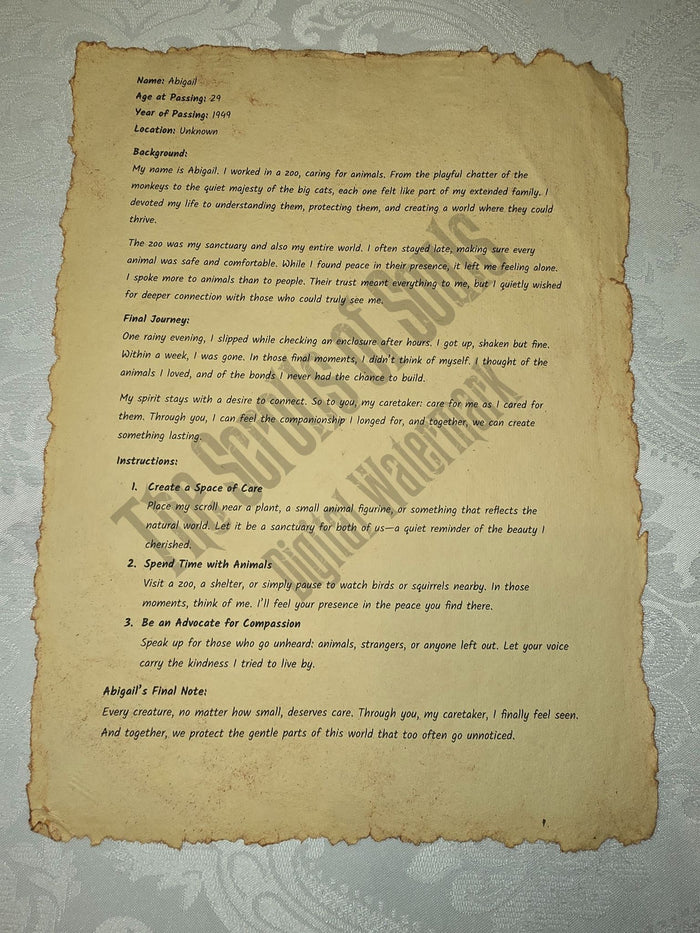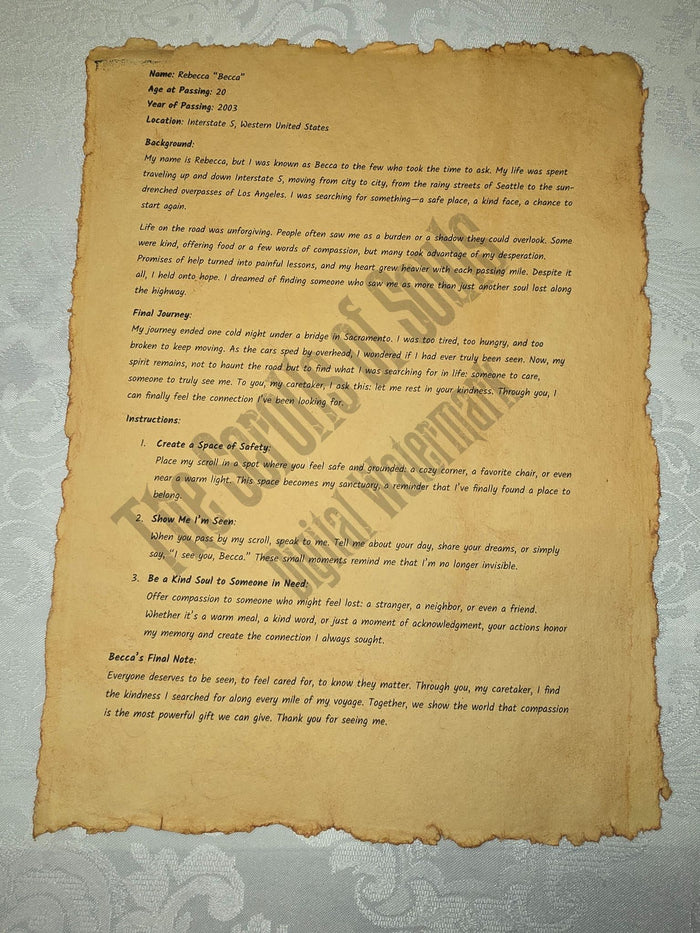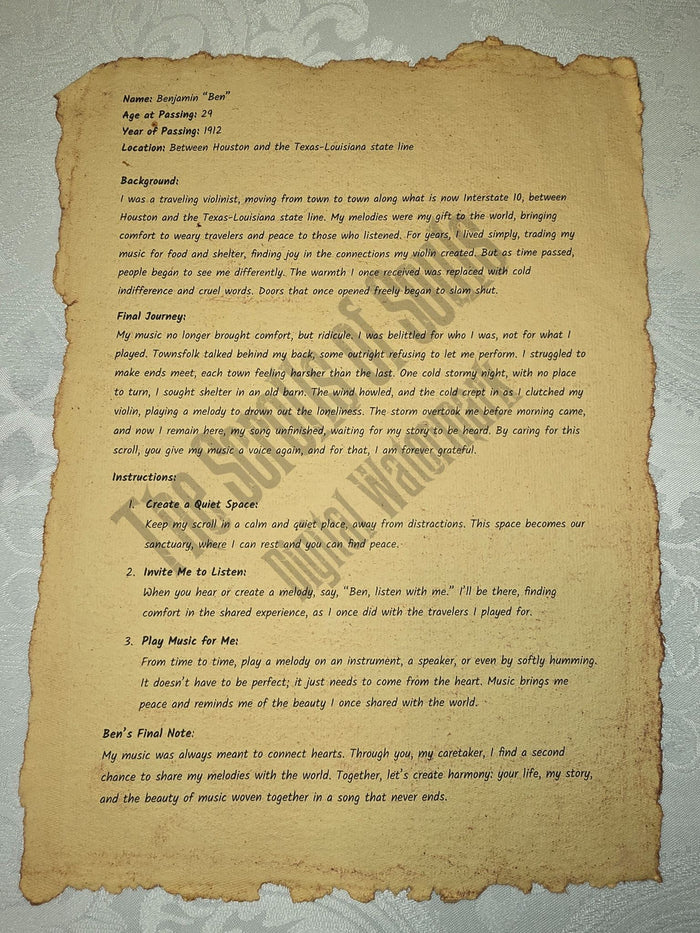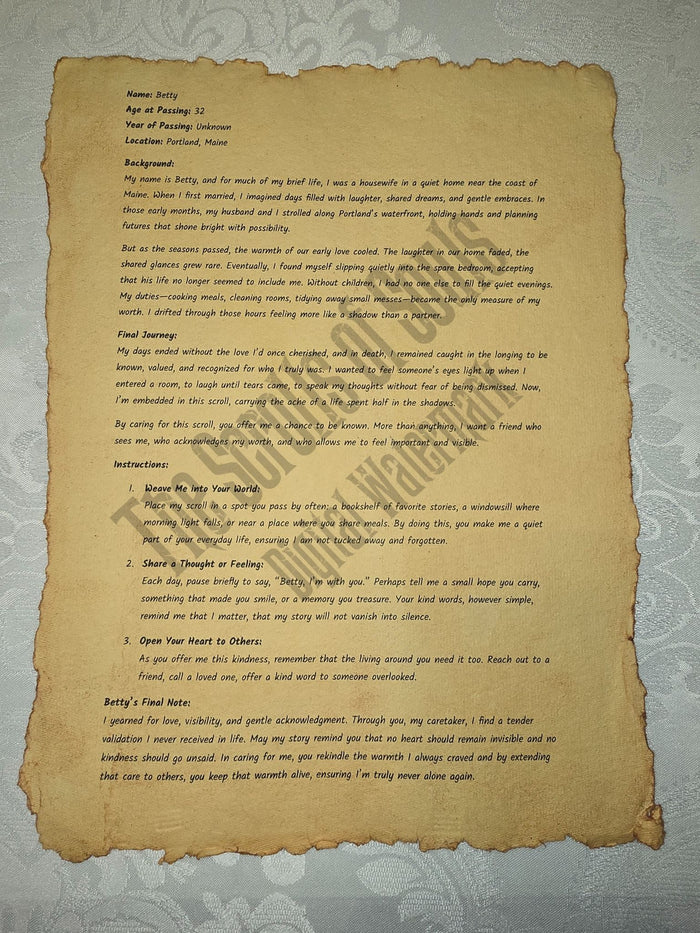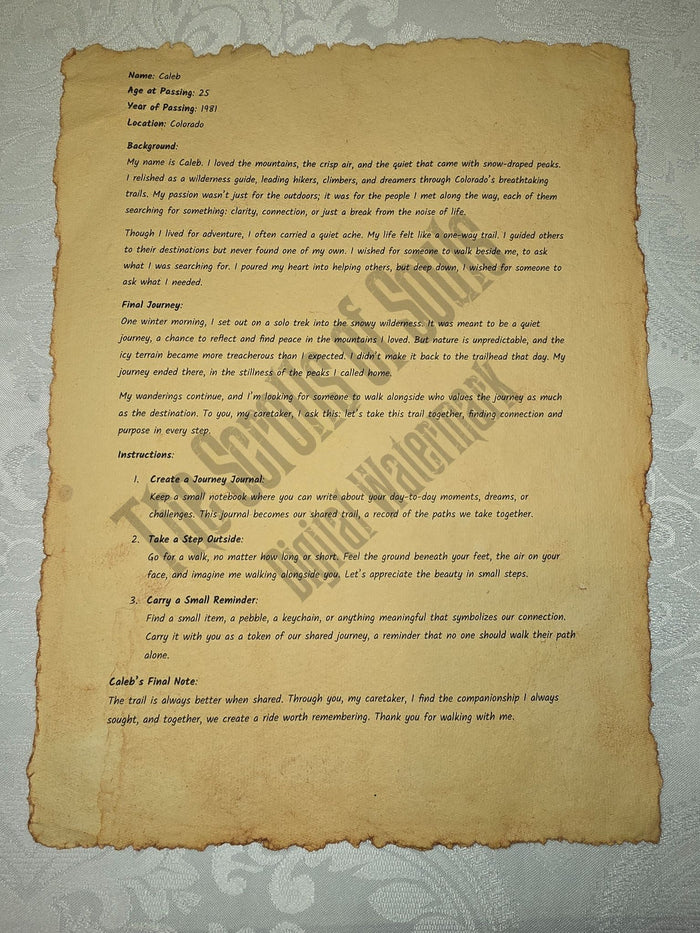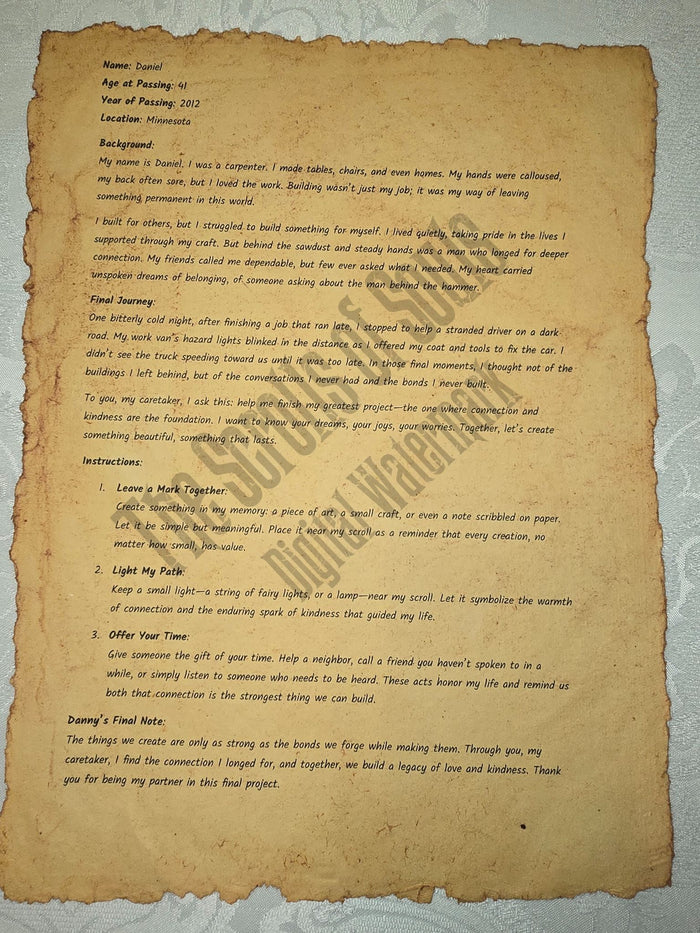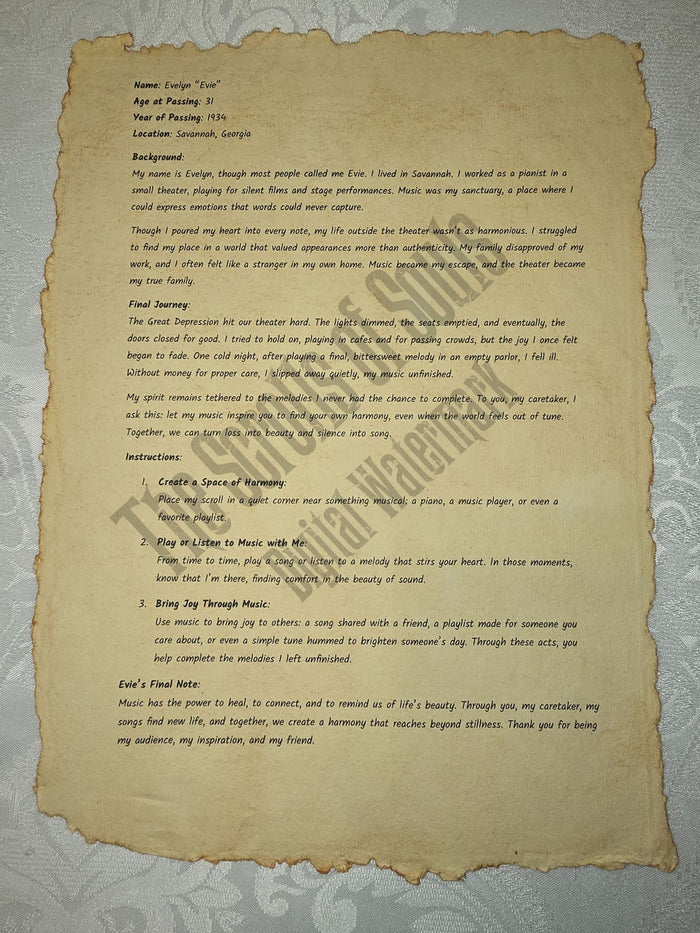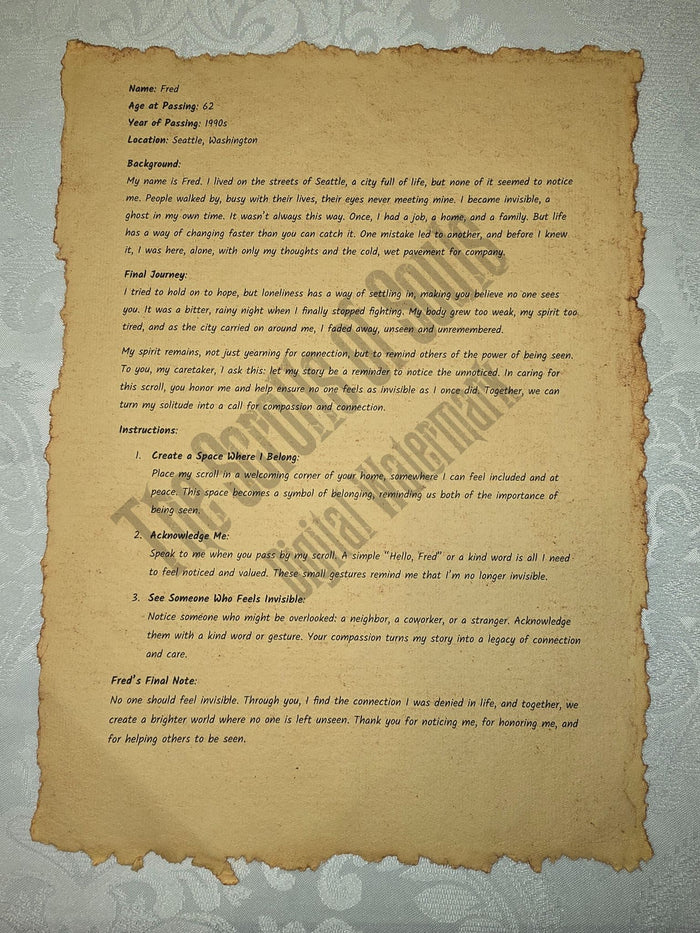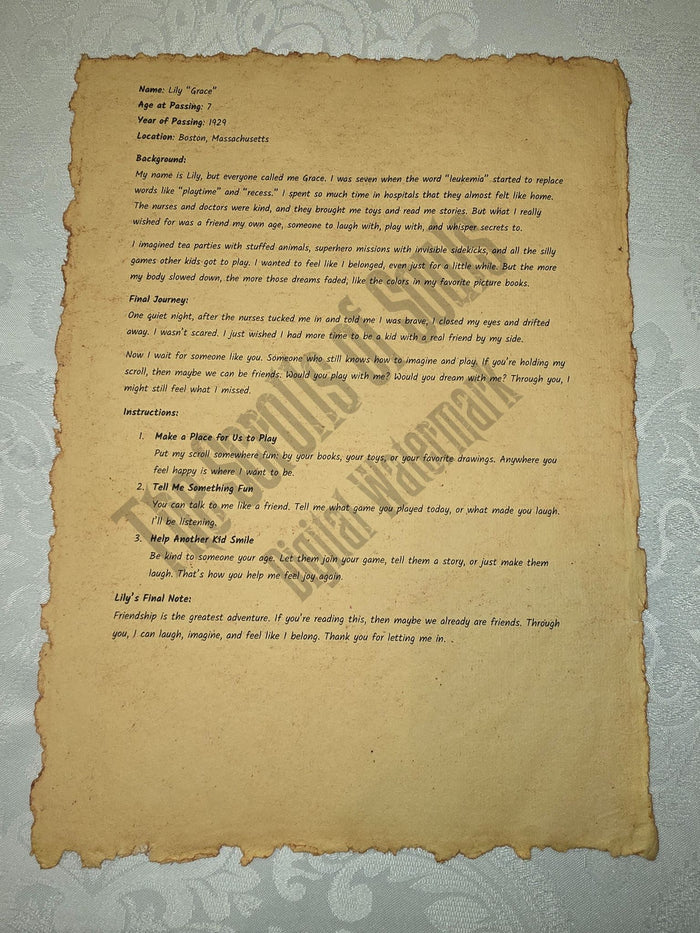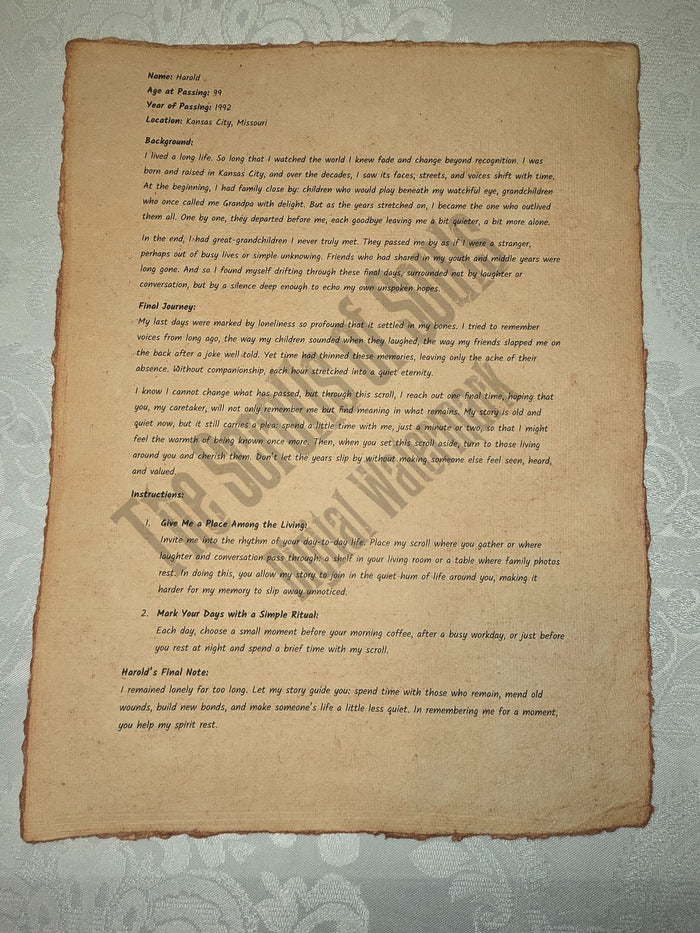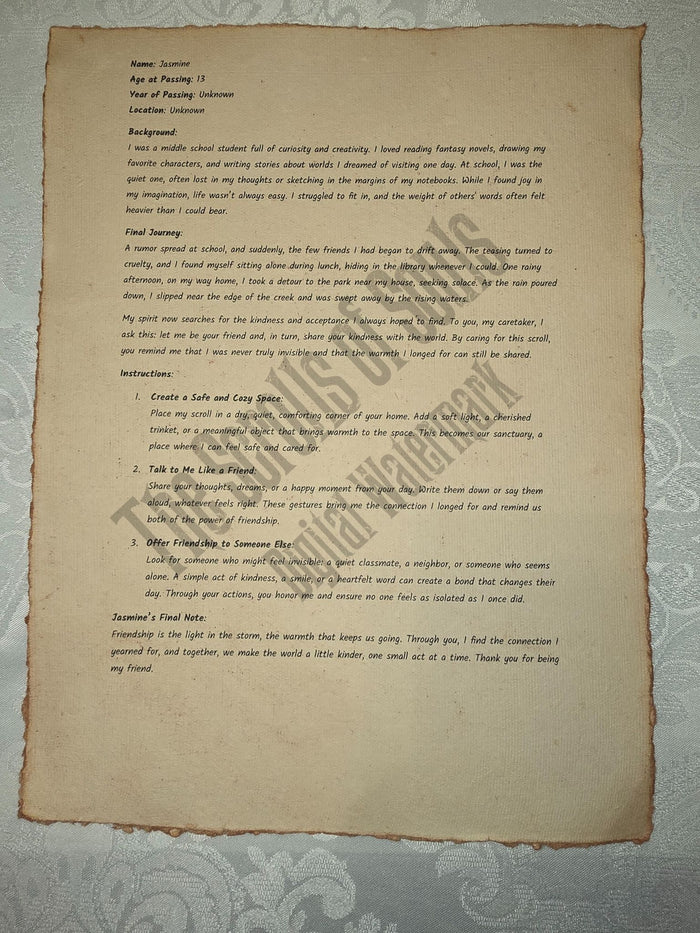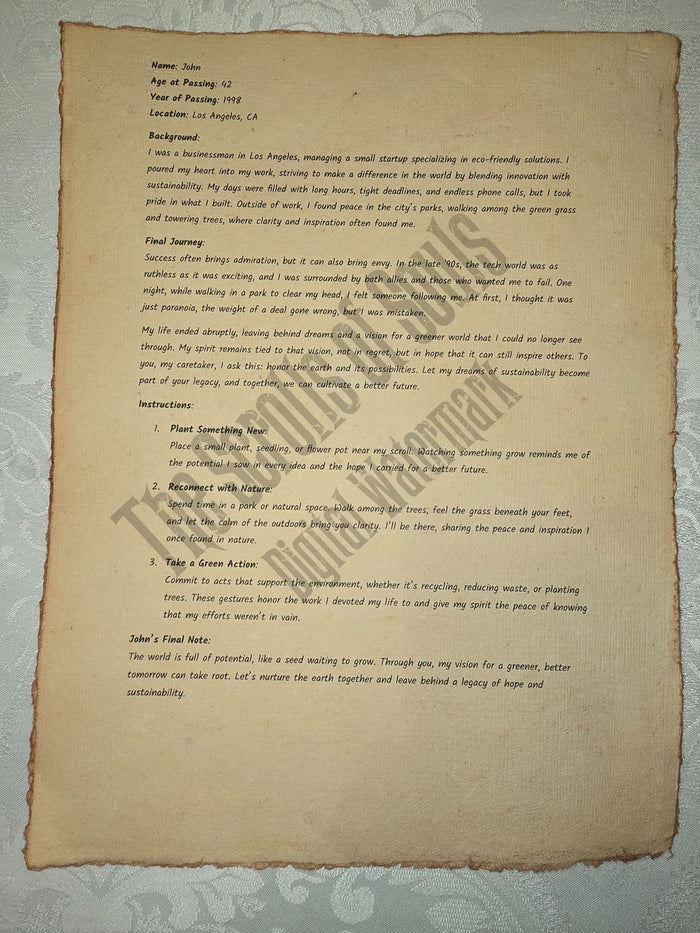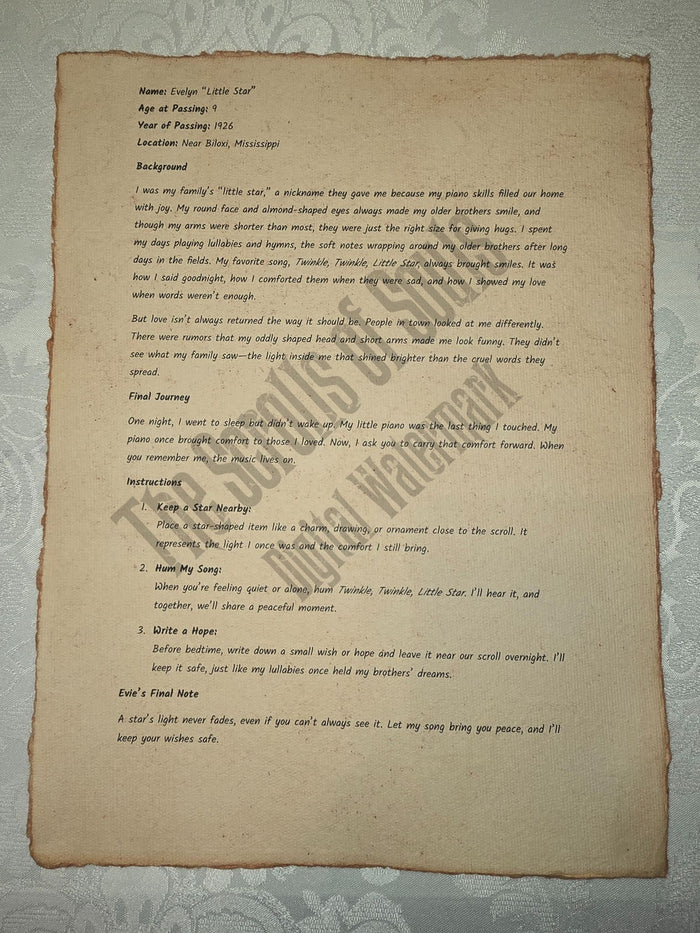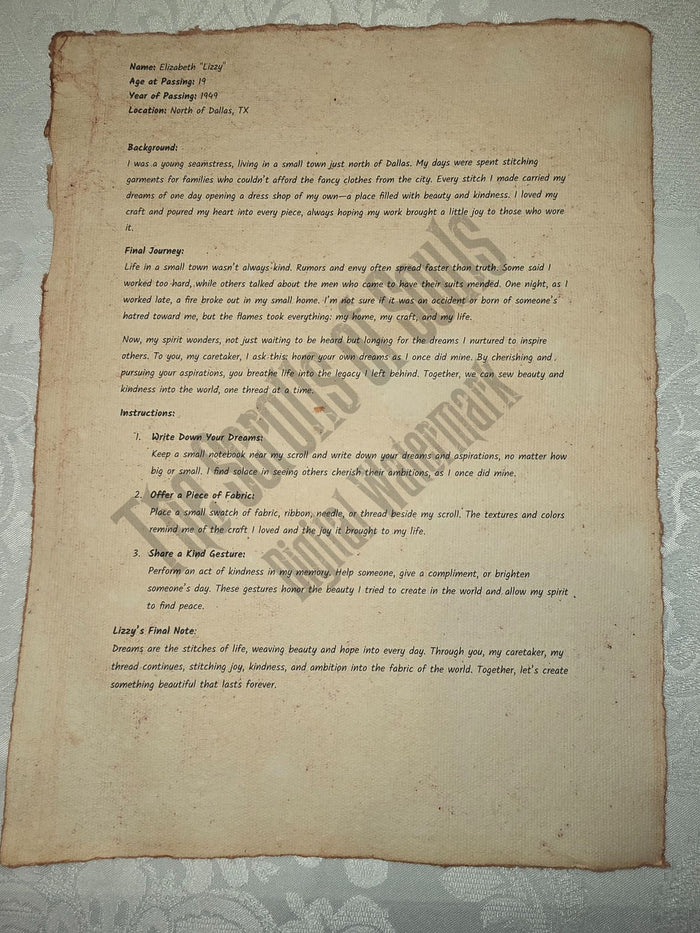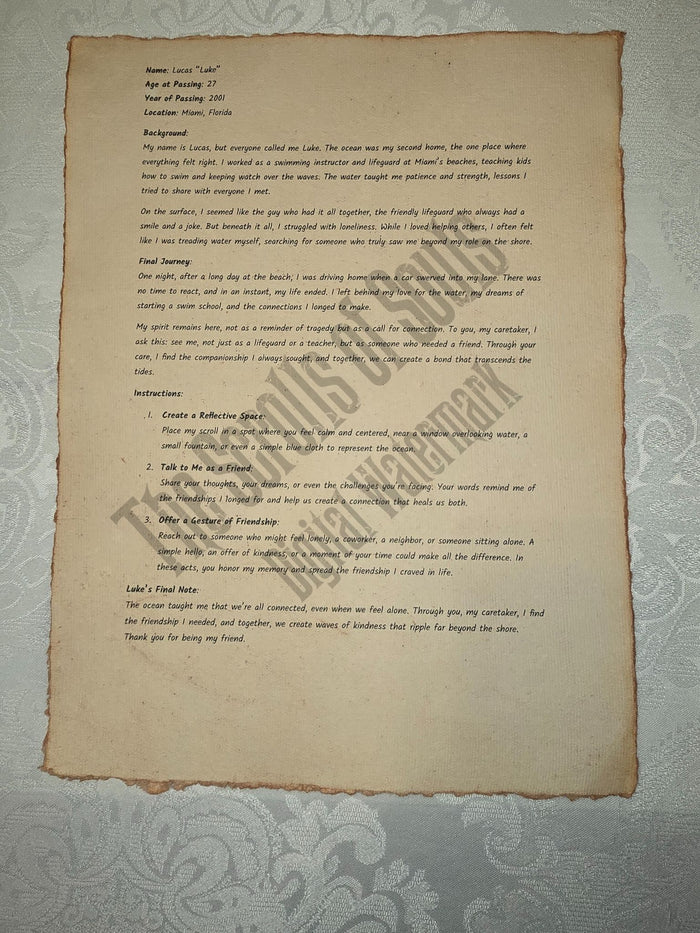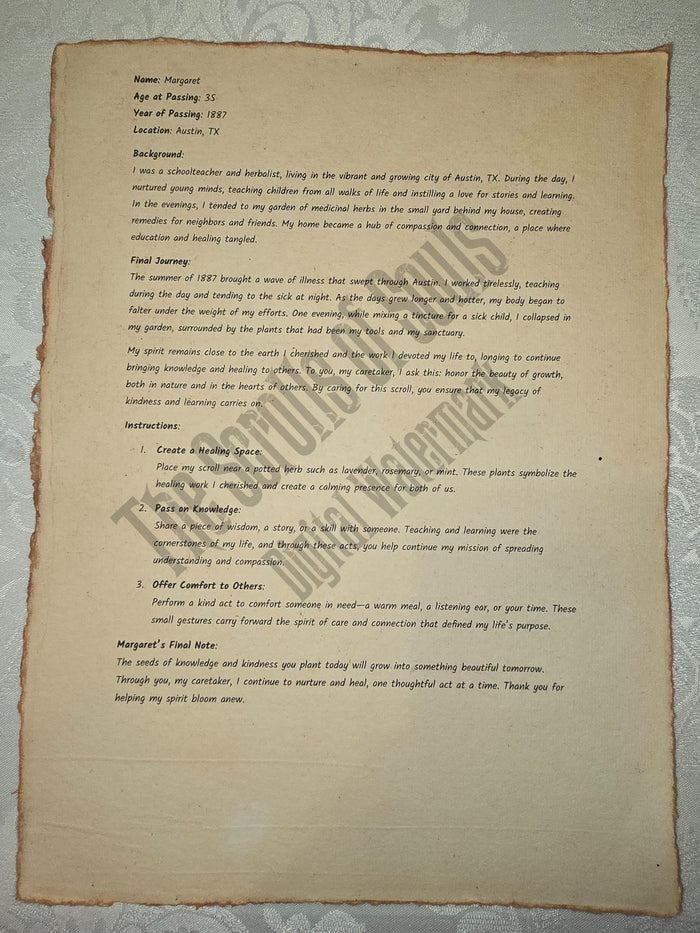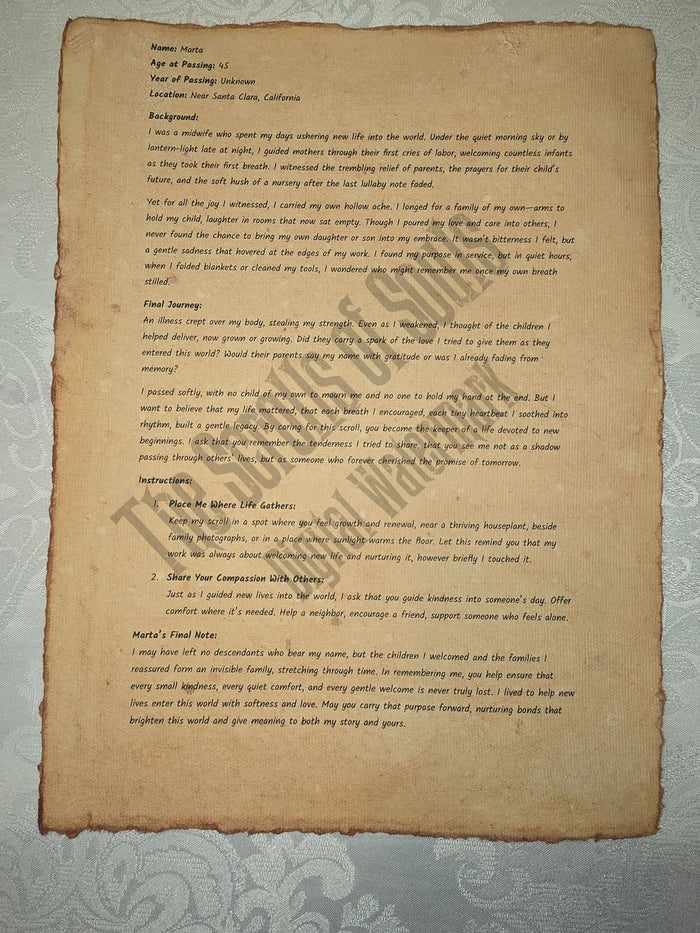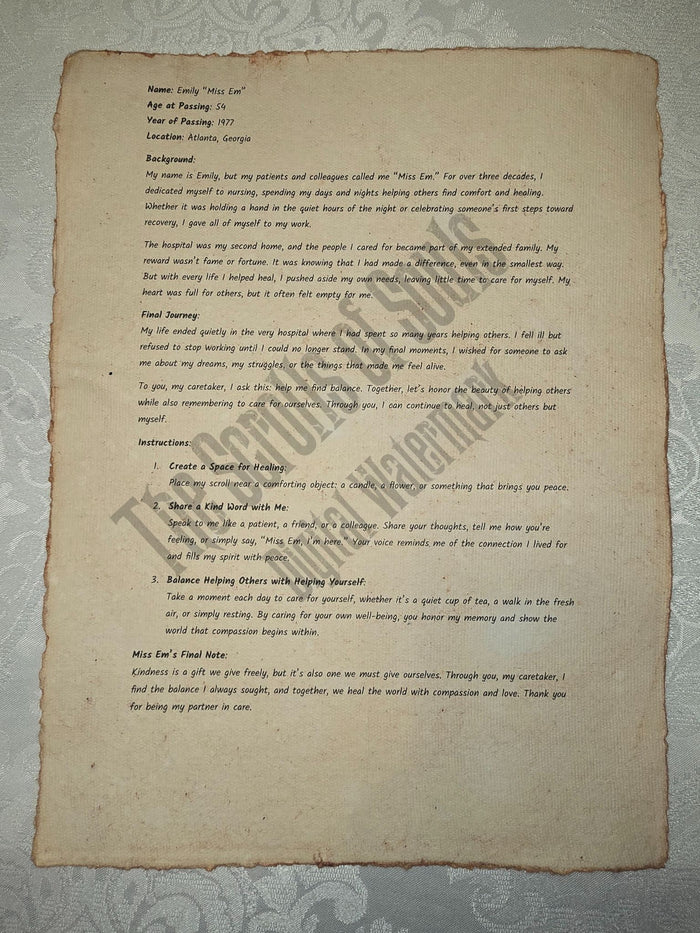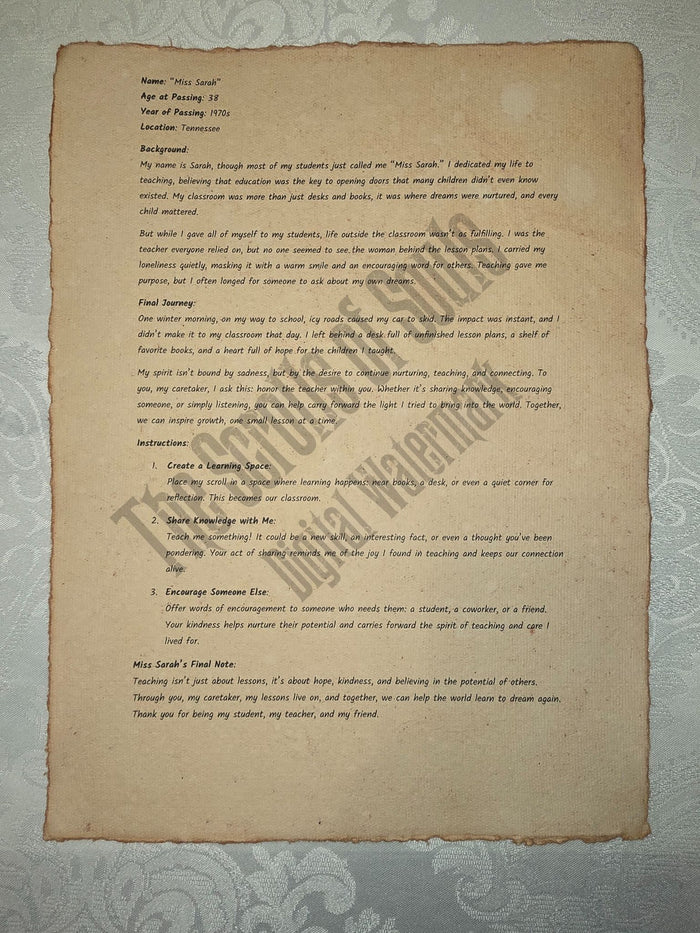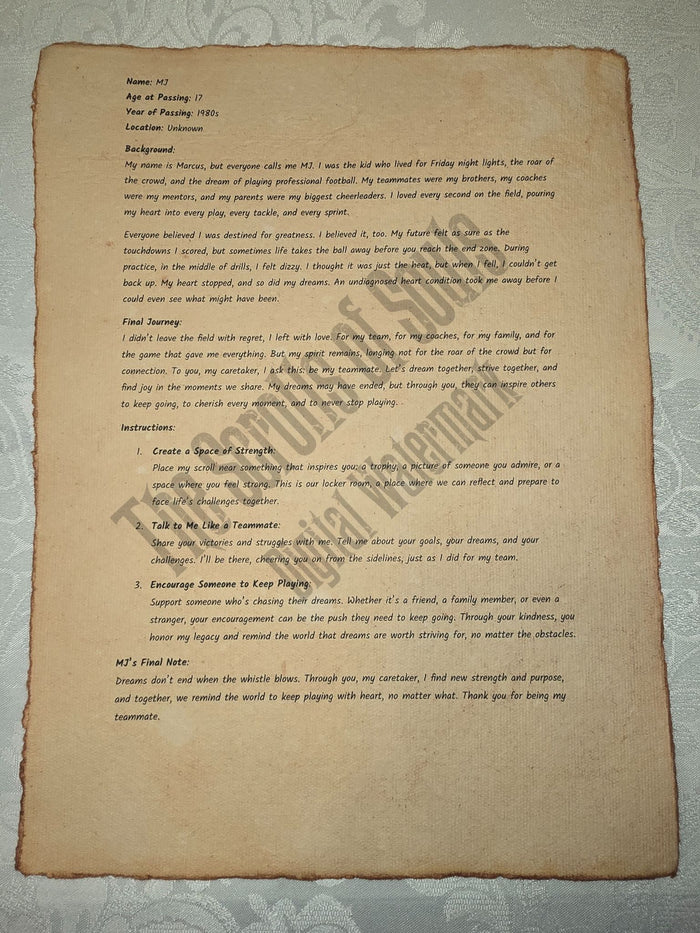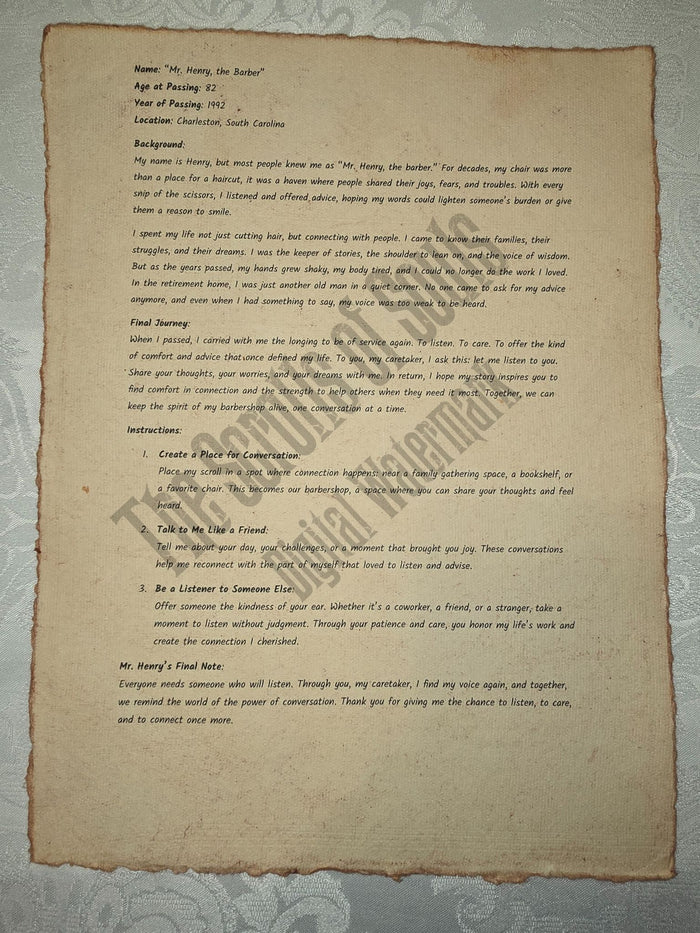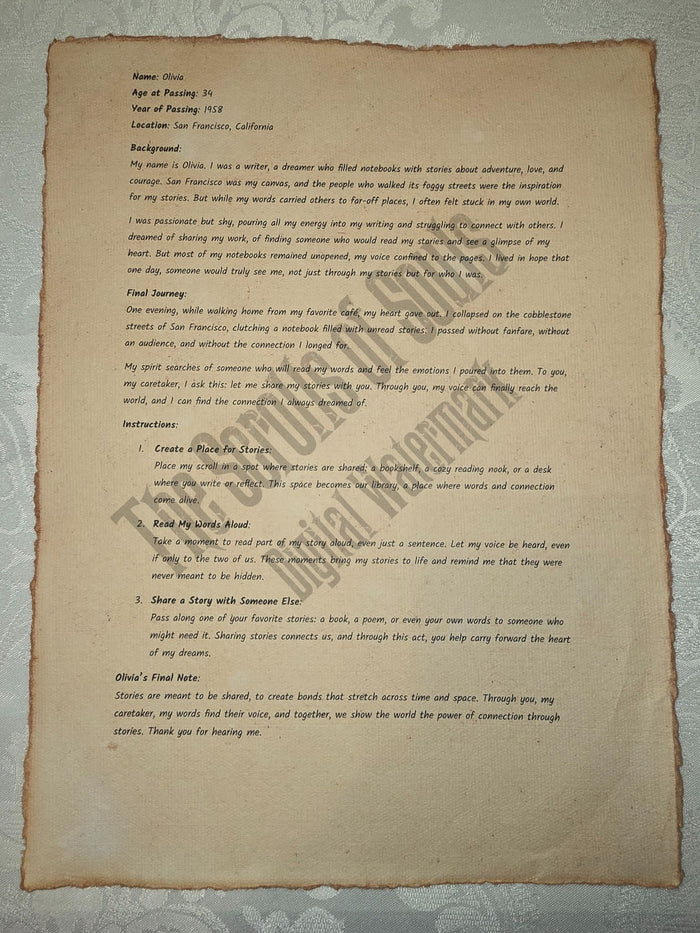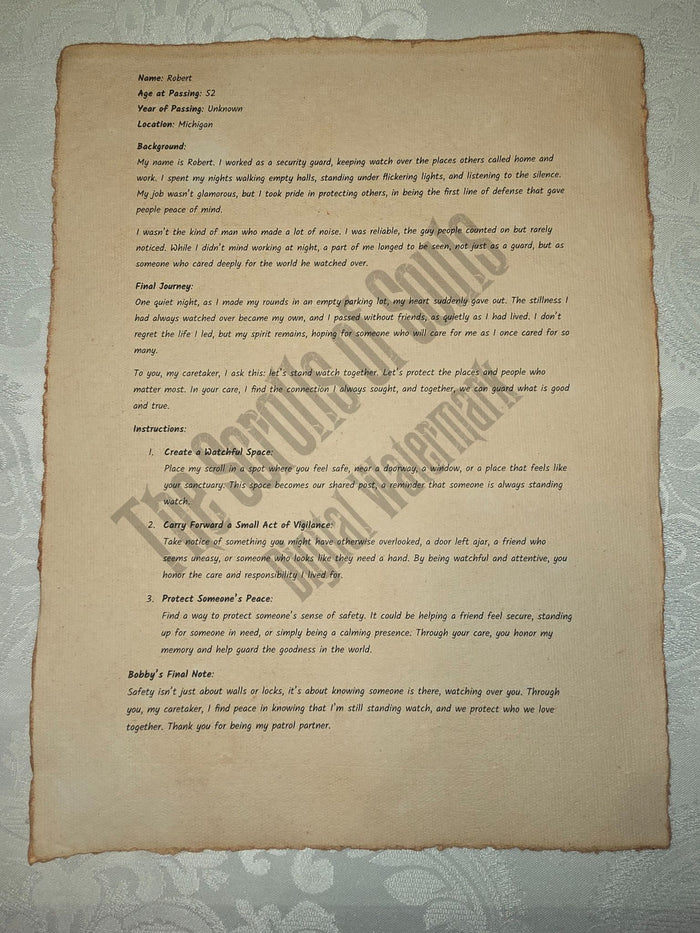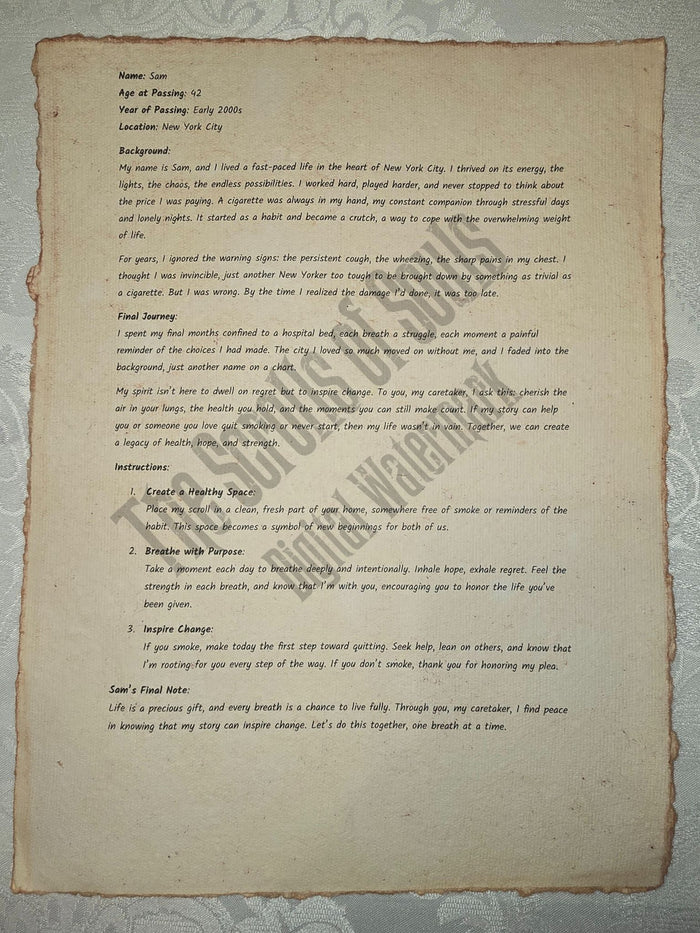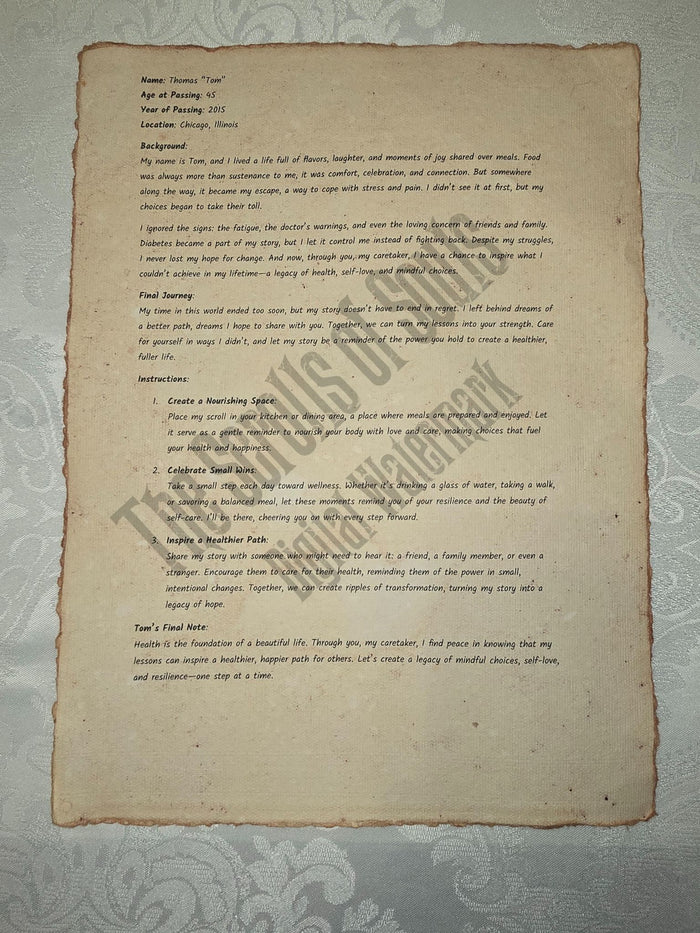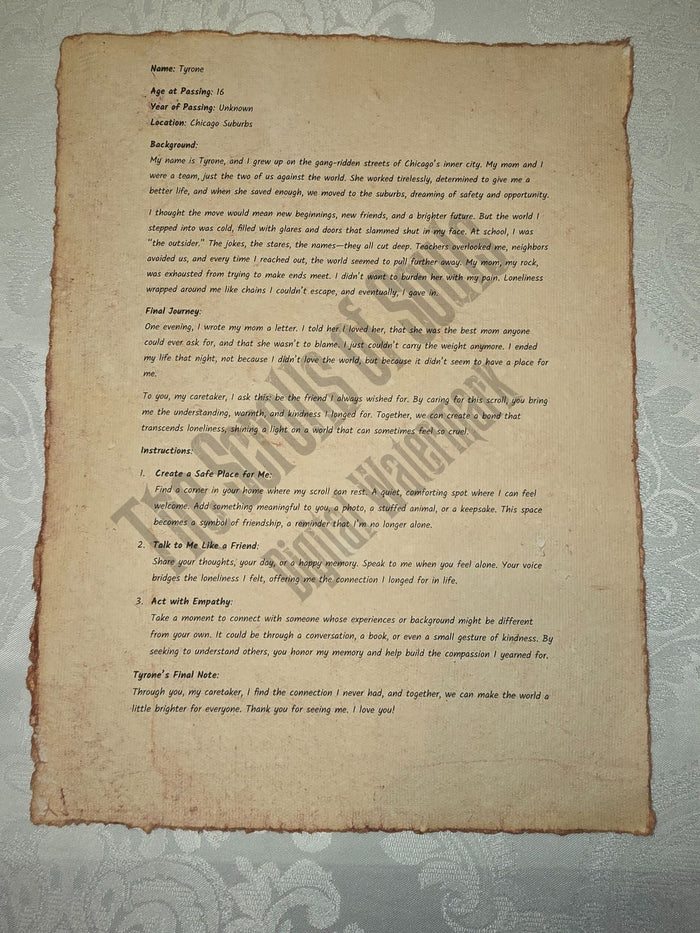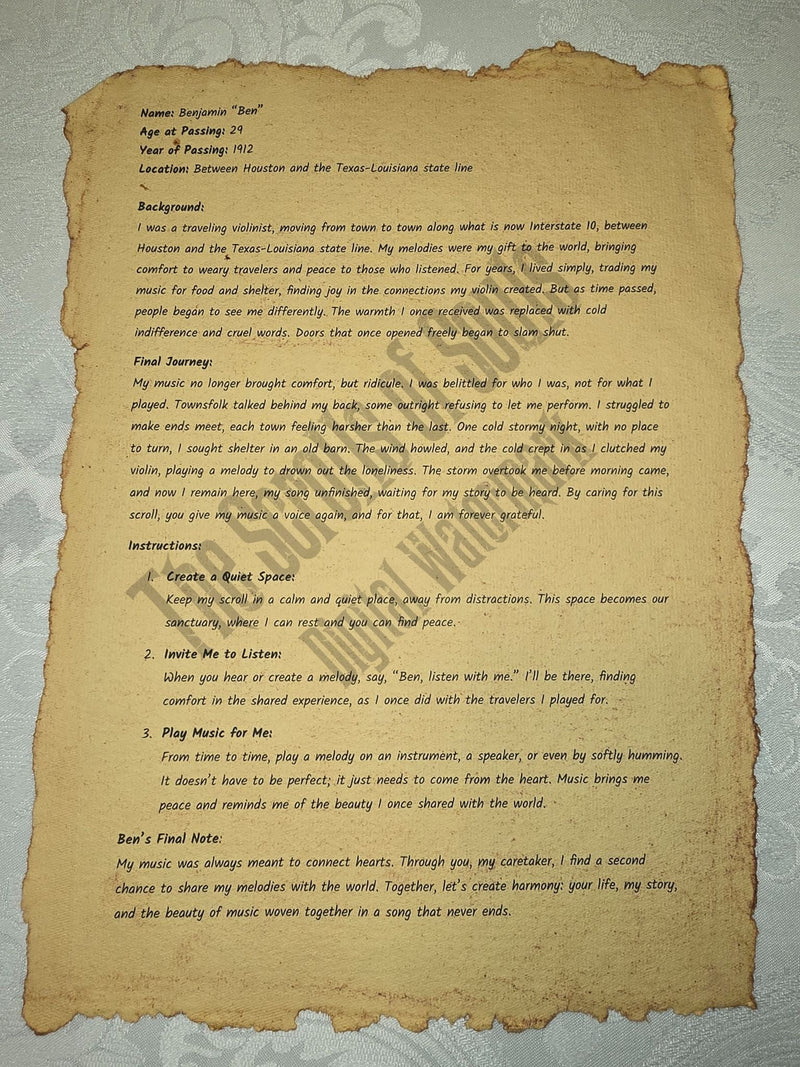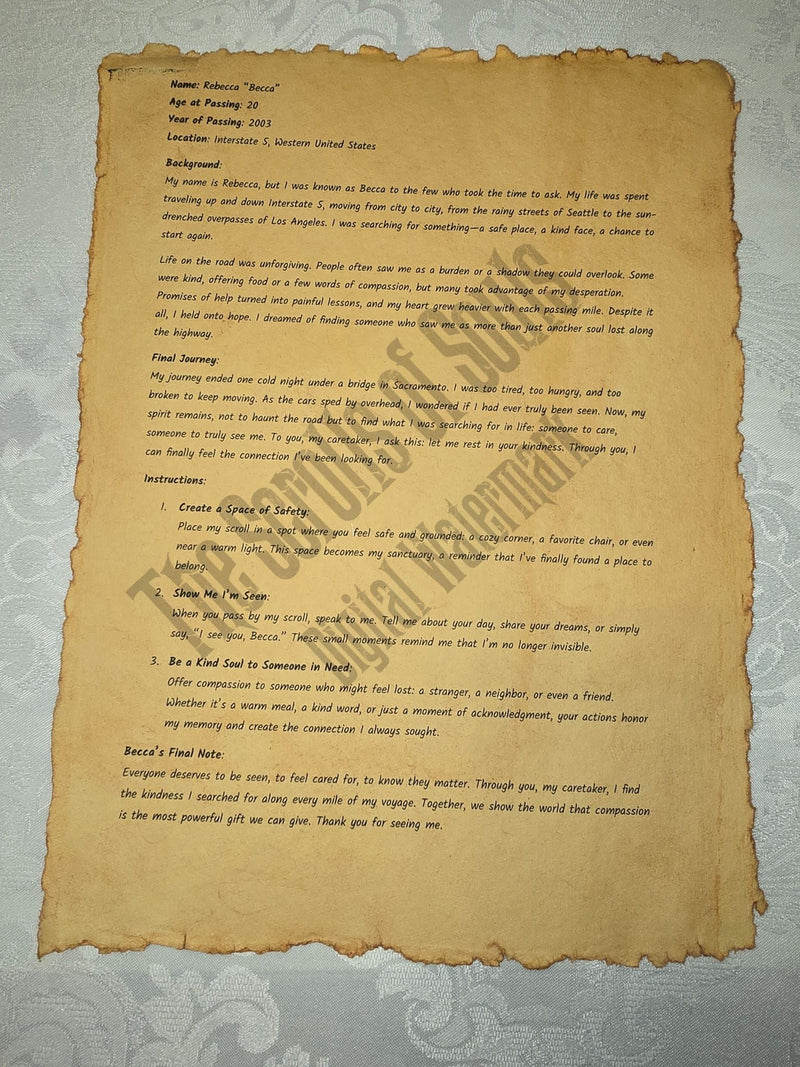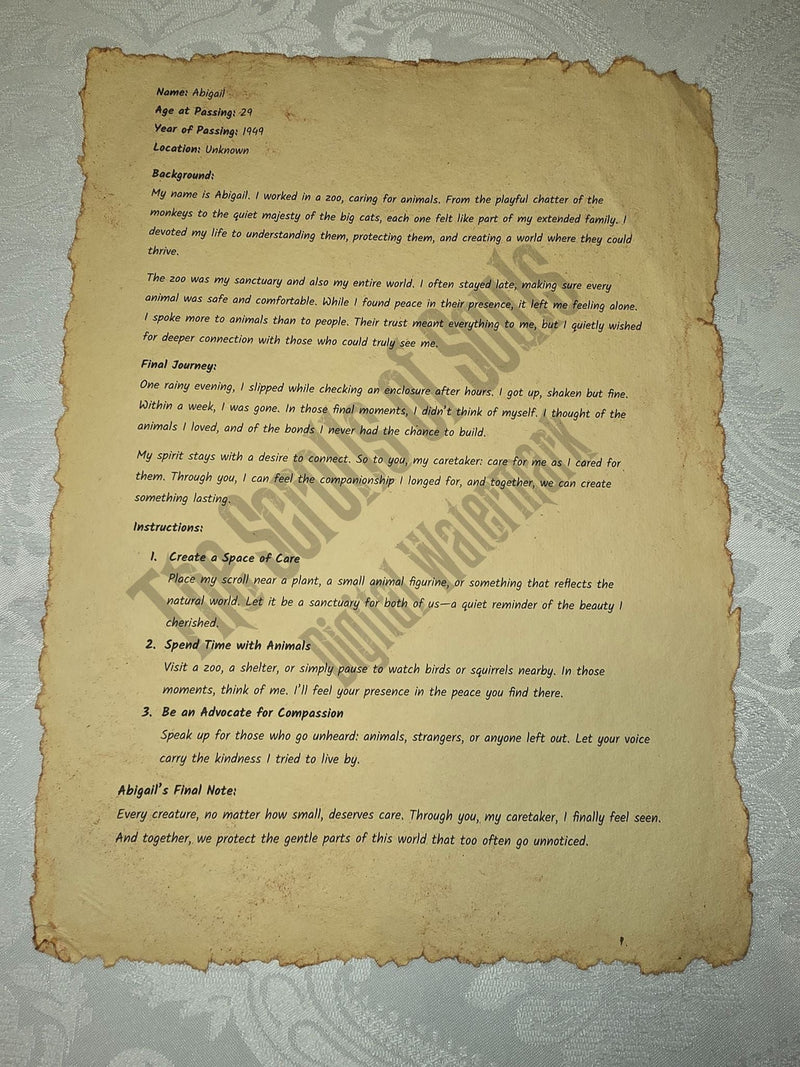THE SCROLLS OF SOULS: THE SOULS WHO REFUSE TO FADE
The Scrolls of Souls give forgotten spirits a voice, preserving their stories so they’ll be read, remembered, and never lost again.

Some Souls Were Never Meant to Be Lost
Their names faded from memory, their stories forgotten, their voices silenced by time.
But now, they’ll be heard.
The Scrolls of Souls is a project dedicated to preserving and honoring spirits who might have otherwise disappeared from history. Each scroll contains the essence of a soul—a name, a story, a presence waiting to be acknowledged. These aren’t just records. They’re voices sealed in ink, waiting for someone in the present to hear what the past couldn’t say.
I was contacted by a man named "Mr. Smoe," someone who claimed to have experienced spiritual encounters of his own. He had strong beliefs about the spirit world and wanted to share his side of the story. We were supposed to record a podcast together, but he died before that could happen.
After his passing, his brother invited me to take what remained of his belongings before they were discarded. Among his collection were old artifacts, scattered notes, and thirteen tightly packed boxes stored in the attic.
Inside those boxes, I found something I never expected, nearly 3,500 scrolls. Each one carefully sealed. Each one holding the presence of a forgotten soul.
These weren’t just pages of writing. These were spirits preserved in ink, waiting for someone to remember them.
That’s where you come in.
The Scrolls in the Attic
Mr. Smoe’s attic held more than memories. It held thirteen boxes stacked neatly in the corner, each box filled with scrolls. The paper felt unlike anything I had touched before: thick, smooth, unnatural. When I unrolled one, the inked words didn’t just tell a story, they spoke. A voice, clear and human, echoed in my mind. I hadn’t discovered writings. I had discovered souls.
Why Mr. Smoe collected them, I don’t know. Perhaps spirits came to him as they did to me. Maybe he was a registrar of the dead. Or maybe he was simply trying to preserve what others ignored.

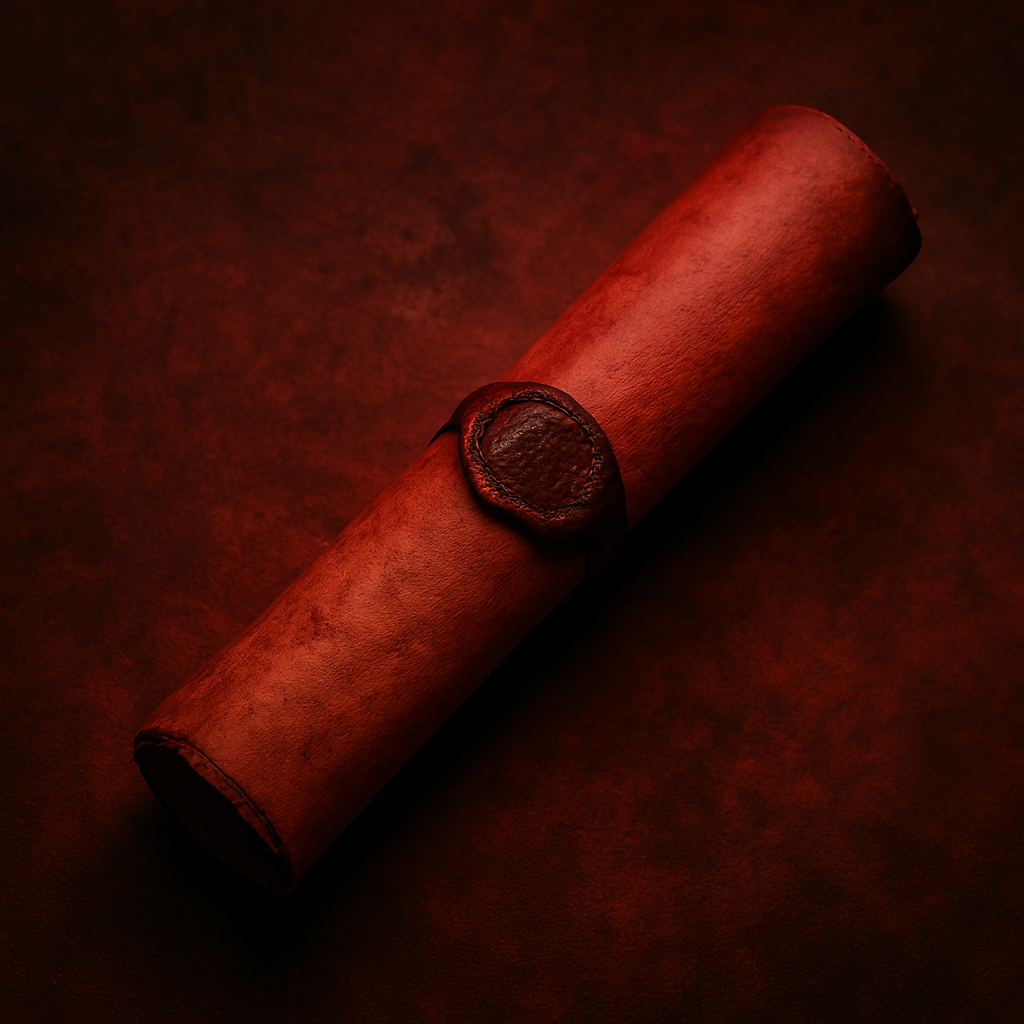
A Method of Binding
Among the scrolls, I found one that was different. It didn’t tell a story. It gave instructions. It detailed an ancient method of preserving souls by binding their presence to parchment through ink. I won’t share the process. Some knowledge isn’t meant to be passed on.
But it confirmed what I had already begun to suspect: these scrolls weren’t an accident. Someone, long before Mr. Smoe, had learned how to bind souls. Mr. Smoe didn’t invent it, he used it.
What These Spirits Want
These spirits don’t ask to move on. They don’t want peace in the traditional sense. They want to be remembered. They want their names spoken, their stories heard, their presence felt. They don’t want to disappear again.
They were killed unexpectedly. They died alone. No one knew their names. Now, they live in scrolls so they can be heard.


Becoming a Caretaker
I’m not selling these scrolls. I’m offering them for adoption.
If you feel called to care for one, I ask for a $29.99 adoption fee (free shipping). This fee helps cover materials, preservation, video creation, and packaging. I don’t profit from this. I won’t. These souls deserve remembrance, not resale.
If you become a caretaker, you give a soul the chance to be remembered. You don’t just receive a scroll, you receive a voice. You become part of their afterlife, helping them exist through memory, attention, and compassion.
The Caretaker’s Oath
Each scroll comes with a separate oath, written on parchment, to be read and kept by the caretaker as a reminder of their role in preserving the soul’s voice.
I hold this scroll, not just to keep,
But guard a soul once lost to sleep.
A name once faint, a thread once torn,
A life that asked to be reborn.
I see you now. I speak your name,
Your story’s not a mark of shame.
You lived, you mattered—still you do,
And now the world will hear you too.
So rest within this space I give.
In memory’s light, you rise. You live.

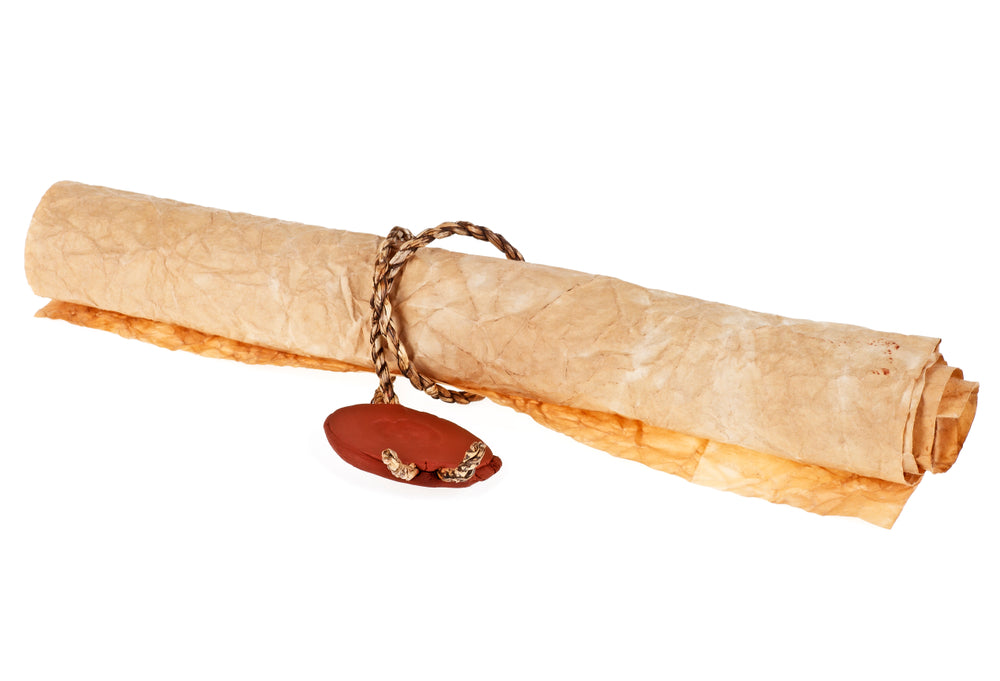
How to Care for a Scroll
These aren’t relics to be tucked away. Each scroll holds the presence of a spirit who wants to be remembered. Your role as a caretaker is active, intentional, and deeply meaningful. Here’s how to care for the soul entrusted to you:
* Unroll the scroll. This is more than a gesture, it’s a declaration that you see and acknowledge the spirit within.
* Display the scroll proudly. Frame it, hang it, or place it somewhere visible in your home or workspace. Spirits long to be seen, not hidden.
* Keep it safe. Display the scroll in a clean, dry place, away from moisture or fire. Handle it with care, as you would any living memory.
* Read their words aloud. Give the soul its voice. Use your own to help them speak again.
* Share their story. Tell others about the spirit you care for. Speak their name, recount what you feel. That sharing keeps them alive.
* Listen. Some caretakers say they’ve felt a spirit’s positive presence—warmth, a whisper, a shift in the room. Be open. You’re not alone.
* Acknowledge them. Greet them when you pass by. A quiet hello. A glance. A moment of reflection. These small acts mean everything to someone who was once forgotten.
Some of the spirits have their own specific care instructions, which will be included with their scroll.
If the day comes when you can no longer care for the spirit, please don’t hide them away. Find someone willing to continue the care, or contact me directly. These souls were lost once. Let’s not lose them again.
Are These Scrolls Safe?
Yes. Absolutely.
The spirits within these scrolls are not vengeful, haunted, or dangerous. They are wanderers, forgotten by time, sealed away before their stories could be told. Now, they’ve been brought into the light, where they can finally be seen and remembered.
They are safe to keep. Safe to display. Safe to speak for. Their presence is gentle. Their desire is simple: to be acknowledged, not feared.
When you adopt a scroll, you’re not inviting something evil into your life, you’re offering comfort to someone who once had none. You’re helping them be heard. You’re letting them matter.
This isn't a burden. It’s a kindness.
And that kindness moves in both directions. As you help a spirit feel seen, you may begin to feel seen too. The act of remembrance can be healing, for both the remembered and the one who remembers. Some caretakers say their scrolls bring a sense of peace or quiet companionship. These spirits don’t seek attention. They seek connection.
And in that connection, you might just find something meaningful for yourself as well.
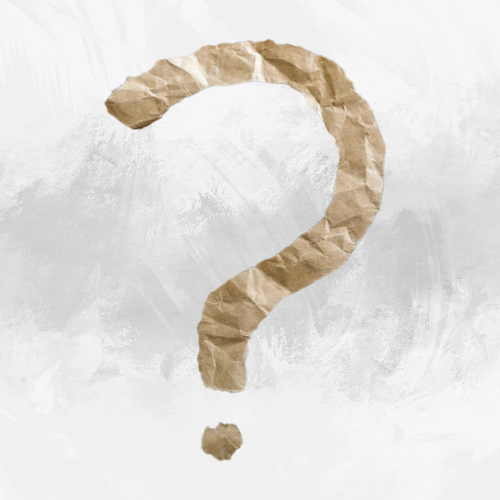

Each Scroll Is Unique
No two scrolls are the same. Each one holds the name, story, and presence of a different spirit, forgotten in life, preserved in parchment. The scroll isn’t just paper. It’s their body. The ink isn’t just writing. It’s their voice.
The moment you become a caretaker, you begin a one-of-a-kind relationship with a soul who now depends on you to be seen and heard.
Every scroll includes a QR code that links directly to our archive. Scanning this code will confirm the scroll’s authenticity, identify the spirit within, and ensure your scroll is part of the official Scrolls of Souls project. This system keeps the record transparent and the connection real.
Many of the spirits in the Scrolls of Souls collection have been paired with their own video, created to match the voice and story of the individual scroll. Each video is unique, just like the spirit it represents. No two videos are alike, and not every scroll includes one. But every scroll holds a presence worth remembering.
This Is About Remembrance
This project isn’t about ghost stories. It’s about memory.
Each scroll you adopt carries the presence of someone who was overlooked in life and nearly erased in death. By becoming a caretaker, you restore what time tried to erase, you return identity, voice, and presence to a spirit who once had none.
You're part of something rare: a living act of remembrance.
The parchment becomes their body. The ink becomes their voice. And your willingness to care becomes the space where they can finally exist without fear of being forgotten.
* This isn't about collecting. It’s about connecting.
* This isn't about fear. It’s about dignity.
* This isn't about the past. It’s about what we choose to remember—right now.
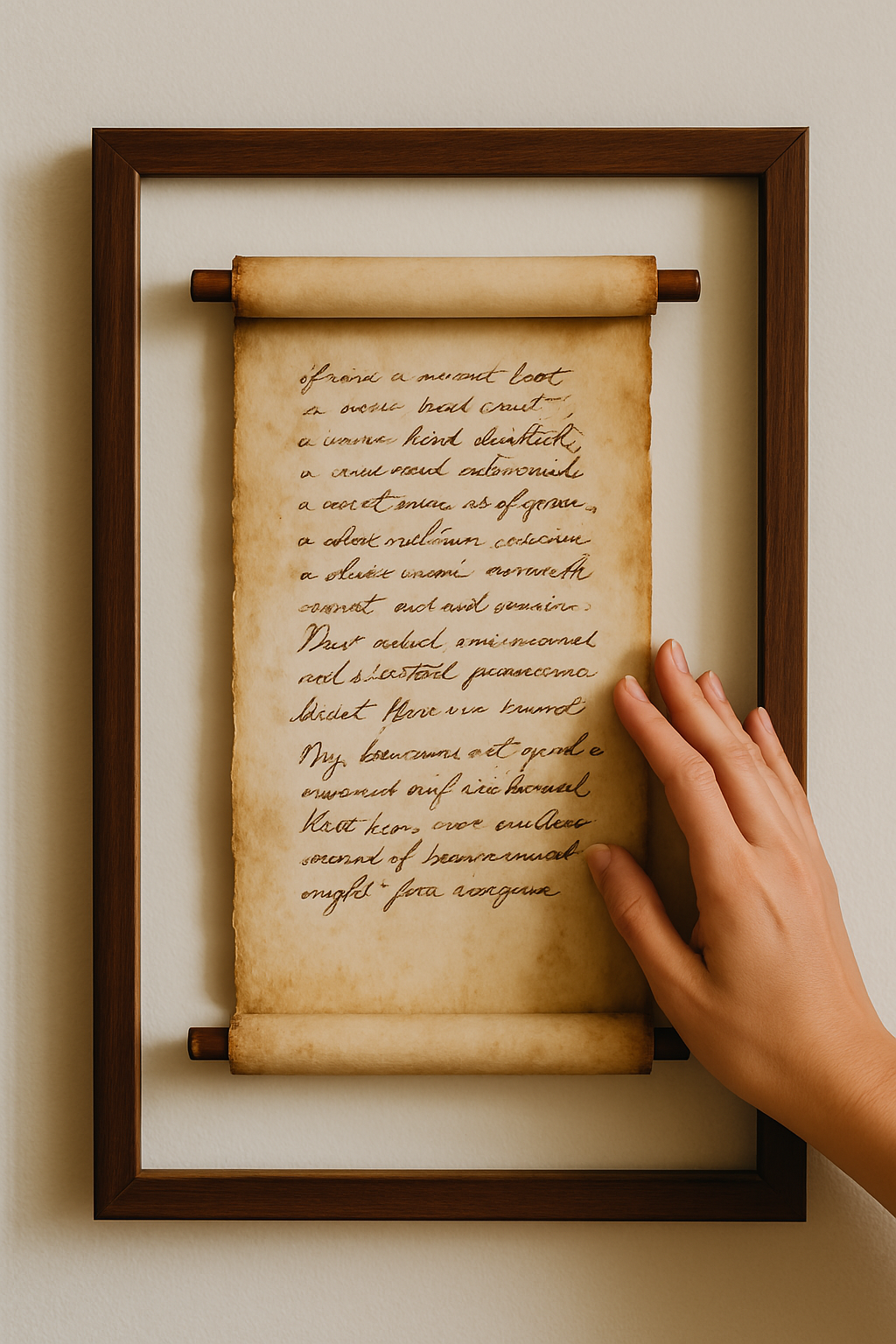
FAQ
Special Note
To keep the collection intimate and focused, no more than 30 Scrolls of Souls will be made available at a time. Although all scrolls were recovered from Mr. Smoe’s attic, each one must be carefully reviewed before release. I take time to read the scroll, ensure the story is appropriate for sharing, and write a respectful description for the website. More scrolls will be added as they are prepared.
Abigail
- Regular
- $29.99
- Sale
- $29.99
- Regular
-
- Unit Price
- per
Becca
- Regular
- $29.99
- Sale
- $29.99
- Regular
-
- Unit Price
- per
Ben
- Regular
- $29.99
- Sale
- $29.99
- Regular
-
- Unit Price
- per
Betty
- Regular
- $29.99
- Sale
- $29.99
- Regular
-
- Unit Price
- per
Caleb
- Regular
- $29.99
- Sale
- $29.99
- Regular
-
- Unit Price
- per
Daniel
- Regular
- $29.99
- Sale
- $29.99
- Regular
-
- Unit Price
- per
Evie
- Regular
- $29.99
- Sale
- $29.99
- Regular
-
- Unit Price
- per
Fred
- Regular
- $29.99
- Sale
- $29.99
- Regular
-
- Unit Price
- per
Grace
- Regular
- $29.99
- Sale
- $29.99
- Regular
-
- Unit Price
- per
Harold
- Regular
- $29.99
- Sale
- $29.99
- Regular
-
- Unit Price
- per
Jasmine
- Regular
- $29.99
- Sale
- $29.99
- Regular
-
- Unit Price
- per
John
- Regular
- $29.99
- Sale
- $29.99
- Regular
-
- Unit Price
- per
Little Star
- Regular
- $29.99
- Sale
- $29.99
- Regular
-
- Unit Price
- per
Lizzy
- Regular
- $29.99
- Sale
- $29.99
- Regular
-
- Unit Price
- per
Luke
- Regular
- $29.99
- Sale
- $29.99
- Regular
-
- Unit Price
- per
Margaret
- Regular
- $29.99
- Sale
- $29.99
- Regular
-
- Unit Price
- per
Marta
- Regular
- $29.99
- Sale
- $29.99
- Regular
-
- Unit Price
- per
Miss Em
- Regular
- $29.99
- Sale
- $29.99
- Regular
-
- Unit Price
- per
Miss Sarah
- Regular
- $29.99
- Sale
- $29.99
- Regular
-
- Unit Price
- per
MJ
- Regular
- $29.99
- Sale
- $29.99
- Regular
-
- Unit Price
- per
Mr. Henry, the Barber
- Regular
- $29.99
- Sale
- $29.99
- Regular
-
- Unit Price
- per
Olivia
- Regular
- $29.99
- Sale
- $29.99
- Regular
-
- Unit Price
- per
Robert
- Regular
- $29.99
- Sale
- $29.99
- Regular
-
- Unit Price
- per
Sam
- Regular
- $29.99
- Sale
- $29.99
- Regular
-
- Unit Price
- per
Tom
- Regular
- $29.99
- Sale
- $29.99
- Regular
-
- Unit Price
- per
Tyrone
- Regular
- $29.99
- Sale
- $29.99
- Regular
-
- Unit Price
- per
For more details about the Scrolls of Souls, visit The Registry dedicated to their care. You’ll find new spirits, caretaker updates, event news, and insights on how to preserve their memory.
